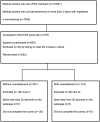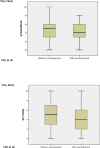Influence of overstated abstract conclusions on clinicians: a web-based randomised controlled trial
- PMID: 29247102
- PMCID: PMC5736039
- DOI: 10.1136/bmjopen-2017-018355
Influence of overstated abstract conclusions on clinicians: a web-based randomised controlled trial
Abstract
Objectives: To investigate whether overstatements in abstract conclusions influence primary care physicians' evaluations when they read reports of randomised controlled trials (RCTs) DESIGN: RCT setting: This study was a parallel-group randomised controlled survey, conducted online while masking the study hypothesis.
Participants: Volunteers were recruited from members of the Japan Primary Care Association in January 2017. We sent email invitations to 7040 primary care physicians. Among the 787 individuals who accessed the website, 622 were eligible and automatically randomised into 'without overstatement' (n=307) and 'with overstatement' (n=315) groups.
Interventions: We selected five abstracts from published RCTs with at least one non-significant primary outcome and overstatement in the abstract conclusion. To construct a version without overstatement, we rewrote the conclusion sections. The methods and results sections were standardised to provide the necessary information of primary outcome information when it was missing in the original abstract. Participants were randomly assigned to read an abstract either with or without overstatements and asked to evaluate the benefit of the intervention.
Outcome measures: The primary outcome was the participants' evaluation of the benefit of the intervention discussed in the abstract, on a scale from 0 to 10. A secondary outcome was the validity of the conclusion.
Results: There was no significant difference between the groups with respect to their evaluation of the benefit of the intervention (mean difference: 0.07, 95% CI -0.28 to 0.42, p=0.69). Participants in the 'without' group considered the study conclusion to be more valid than those in the 'with' group (mean difference: 0.97, 95% CI 0.59 to 1.36, P<0.001).
Conclusion: The overstatements in abstract conclusions did not significantly influence the primary care physicians' evaluations of the intervention effect when necessary information about the primary outcomes was distinctly reported.
Trial registration number: UMIN000025317; Pre-results.
Keywords: clinical trial; general practice; overstatements; primary care physicians; randomised controlled trials; reporting bias.
© Article author(s) (or their employer(s) unless otherwise stated in the text of the article) 2017. All rights reserved. No commercial use is permitted unless otherwise expressly granted.
Conflict of interest statement
Competing interests: TAF has received lecture fees from Eli Lilly, Janssen, Meiji, Mitsubishi-Tanabe, MSD and Pfizer and consultancy fees from Takeda Science Foundation. He has received research support from Mochida and Mitsubishi-Tanabe.
Figures


Similar articles
-
Effect of Recruitment Methods on Response Rate in a Web-Based Study for Primary Care Physicians: Factorial Randomized Controlled Trial.J Med Internet Res. 2018 Feb 8;20(2):e28. doi: 10.2196/jmir.8561. J Med Internet Res. 2018. PMID: 29422450 Free PMC article. Clinical Trial.
-
Physician characteristics associated with proper assessment of overstated conclusions in research abstracts: A secondary analysis of a randomized controlled trial.PLoS One. 2019 Jan 25;14(1):e0211206. doi: 10.1371/journal.pone.0211206. eCollection 2019. PLoS One. 2019. PMID: 30682128 Free PMC article.
-
The Cannabinoid Use in Progressive Inflammatory brain Disease (CUPID) trial: a randomised double-blind placebo-controlled parallel-group multicentre trial and economic evaluation of cannabinoids to slow progression in multiple sclerosis.Health Technol Assess. 2015 Feb;19(12):vii-viii, xxv-xxxi, 1-187. doi: 10.3310/hta19120. Health Technol Assess. 2015. PMID: 25676540 Free PMC article. Clinical Trial.
-
Conclusion.Dis Mon. 2018 Mar 12:S0011-5029(18)30012-9. doi: 10.1016/j.disamonth.2018.01.012. Online ahead of print. Dis Mon. 2018. PMID: 29544977 Review. No abstract available.
-
Conclusion.In: Chronic Kidney Disease and Type 2 Diabetes. Arlington (VA): American Diabetes Association; 2021 Jun. In: Chronic Kidney Disease and Type 2 Diabetes. Arlington (VA): American Diabetes Association; 2021 Jun. PMID: 34279875 Free Books & Documents. Review. No abstract available.
Cited by
-
Effect of Recruitment Methods on Response Rate in a Web-Based Study for Primary Care Physicians: Factorial Randomized Controlled Trial.J Med Internet Res. 2018 Feb 8;20(2):e28. doi: 10.2196/jmir.8561. J Med Internet Res. 2018. PMID: 29422450 Free PMC article. Clinical Trial.
-
Translating and Validating the Japanese Version of the Tolerance for Ambiguity Scale.Med Sci Educ. 2024 Dec 30;35(2):969-976. doi: 10.1007/s40670-024-02269-5. eCollection 2025 Apr. Med Sci Educ. 2024. PMID: 40352995 Free PMC article.
-
Physician characteristics associated with proper assessment of overstated conclusions in research abstracts: A secondary analysis of a randomized controlled trial.PLoS One. 2019 Jan 25;14(1):e0211206. doi: 10.1371/journal.pone.0211206. eCollection 2019. PLoS One. 2019. PMID: 30682128 Free PMC article.
-
Influence of the statistical significance of results and spin on readers' interpretation of the results in an abstract for a hypothetical clinical trial: a randomised trial.BMJ Open. 2022 Apr 8;12(4):e056503. doi: 10.1136/bmjopen-2021-056503. BMJ Open. 2022. PMID: 35396295 Free PMC article. Clinical Trial.
References
Publication types
MeSH terms
LinkOut - more resources
Full Text Sources
Other Literature Sources
